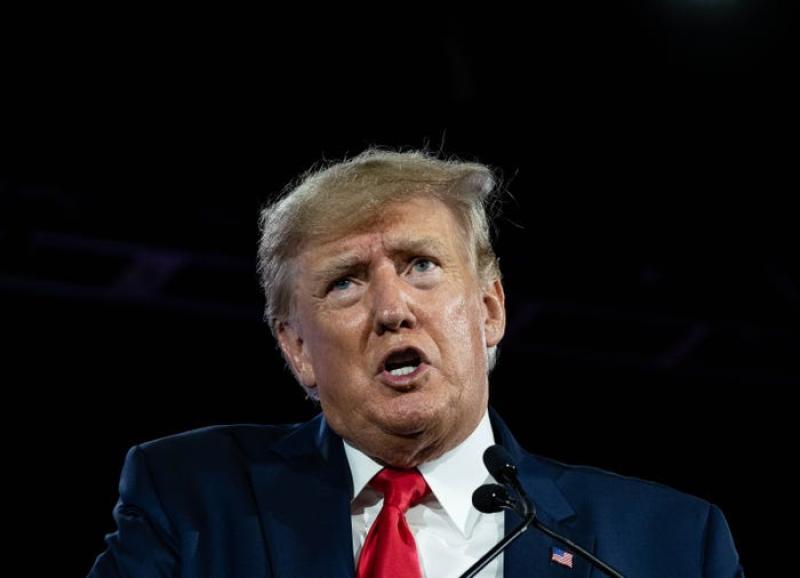Opinion | The Trump Jan. 6 immunity case should end here - The Washington Post



February 6, 2024 at 6:13 p.m. EST
Donald Trumphas no immunity from prosecution for trying to stay in power after losing the 2020 election. The U.S. Court of Appeals for the D.C. Circuit's opinion on this question, handed down on Tuesday, is as firm and forceful as the former president's claims are frivolous. That ought to be the end of the matter, and the Supreme Court now has a chance to say so.
A bipartisan panel took almost a month to produce this week's decision. But, when the three judges finally produced their ruling, they did so per curiam — with a single voice. This choice, from two judges appointed by President Biden and another by George H.W. Bush, not only emphasizes the solidity of the legal reasoning; it also makes it unlikely Mr. Trump will persuade the full appeals court to hear the case, should his lawyers ask. His only remaining option is to apply to the Supreme Court by a Monday deadline the D.C. Circuit has imposed. The justices will then determine whether to take up his petition — and, in so doing, further delay Mr. Trump's trial for his alleged role in the Jan. 6, 2021, Capitol attack, which U.S. District Court Judge Tanya S. Chutkan had scheduled to begin early next month in D.C. but postponed pending resolution of this issue.
They should say no, allowing the D.C. Circuit's ruling to stand. The circuit judges have ably dismantled Mr. Trump's arguments, which were unconvincing to begin with. In 57 pages, the judges lay out the implausibility of the notion that, as they put it, a president "has unbounded authority to commit crimes that would neutralize the most fundamental check on executive power — the recognition and implementation of election results." Indeed, they explain, the presidentalone has the constitutional duty to faithfully execute the laws. How could the president alone also have carte blanche to violate those same laws? Previous presidents, from Richard M. Nixon to Bill Clinton, have understood that they are subject to criminal liability. And whatever chilling effect this produces might well be beneficial, because it can discourage holders of the highest office from illegally abusing their power.
The D.C. Circuit makes another crucial point. Letting Mr. Trump get away with the "unprecedented assault on the structure of our government" of which he's accused would deprive the judiciary and legislature, in their roles overseeing the certification of electoral votes, of the ability the Constitution grants them to check the executive. It would also violate the rights of the people "to vote and to have their votes count."
The Supreme Court should also decline to take up the case because doing so would curb the possibility that Mr. Trump, because of his statuses as a presidential candidate and former president, and because of his determination to use every pretext for delay, might dodge a trial until after the next presidential election. The D.C. Circuit's ruling was accompanied by an order to let Judge Chutkan's pretrial proceedings, suspended thanks to the appeal, resume posthaste. But if the Supreme Court agrees to halt that mandate, all progress will remain suspended until July. This is, of course, precisely what Mr. Trump wants: The former president's apparent master plan is to win reelection before a jury can convict him, then instruct his Justice Department to drop its cases. Unlike in any other criminal prosecution of any other defendant, the question of delay in a case that so deeply implicates the peaceful transition of power presents a unique challenge to the justice system.
If the Supreme Court does take the case, to prevent this same perversion of the rule of law, it should do so on the expedited basis special counsel Jack Smith has requested. Coming to a conclusion shouldn't be difficult in a case as obvious on the merits as this one is. The justices wouldn't display bias against Mr. Trump by denying to take the case, or by hearing his appeal and then deciding against him. On the contrary, the court's conservative members would defang accusations from liberals that they're in thrall to the Republican Party — just as its liberal members might do to charges from conservatives that they are implacably opposed to the former president, should they rule in his favor in the case they're hearing this week on whether the 14th Amendment disqualifies Mr. Trump from appearing on the ballot.
The Supreme Court, in both cases, has an opportunity to prove it is neither pro-Trump nor anti-Trump, and that it is willing neither to abrogate its responsibilities nor to stretch its powers to achieve political ends some on the bench might find desirable.



Democrats don't believe in due process; laws; or the Constitution.
What else is new?
The case is off to SCOTUS.